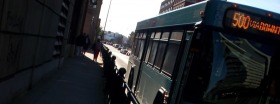- November 30th, 2011
- 0 Comments

Port Authority braces for another slash to service
The Port Authority has begun preparing for service cuts that are more than twice the size of the reductions that took effect in March, when thousands of riders were stranded and others jammed into overcrowded buses.
CEO Steve Bland told the authority board last week that planning has begun for a 35 percent reduction in service hours that will come next fall if Gov. Tom Corbett and the Legislature fail to act on a statewide transportation funding shortfall.
"At the moment, there is no indication that a transportation funding solution is on the immediate horizon," he said.
The authority faces a projected $64 million deficit in the budget for July 2012 to June 2013, caused by runaway health care and pension costs, rising fuel prices and insufficient revenues, including state and county aid that has mostly remained stagnant or decreased.
It is limping through the current fiscal year by using the last $11 million of a $45 million emergency infusion provided last year by outgoing Gov. Ed Rendell and $29 million of its roughly $39 million in reserve funds.
If there is no action in Harrisburg, the authority will release details of planned cuts in January and begin a mandatory public comment period before the reductions are implemented in the fall.
Mr. Bland said the cuts would include elimination of 30 to 40 of the remaining 98 bus routes; layoffs of 500 to 600 of the agency's 2,500 remaining employees; and closure of one or two more bus divisions.
"This would be the worst possible outcome for everyone who relies on transit," he said.
Spokesman Jim Ritchie said frequency of service would likely be reduced on all routes, and deep cuts would occur in off-peak and weekend service. The routes most likely to be eliminated are longer suburban runs that have higher operating costs than inner-city routes, he said.
Ken Zapinski, senior vice president of the Allegheny Conference on Community Development -- which has lobbied for a statewide transit funding solution -- said it was "prudent and responsible" for the authority to prepare for service cuts.
"It's not happy news, but they're doing exactly what they need to do," he said. "I give them a lot of credit for starting this process sooner rather than later. It will give riders and businesses a chance to adjust."
Cuts of the magnitude being discussed would have a severe impact on businesses and the economy, Mr. Zapinski said. Half of Downtown employees and one-quarter of the Oakland workforce use transit.
The cuts that took effect on March 27 eliminated 29 routes, trimmed service frequency on about 80 routes and eliminated 260 jobs, including about 180 union workers who were laid off.
They also led to severe overcrowding on several routes, so bad that drivers routinely have had to bypass bus stops because there was no remaining standing room.
The authority's funding woes are part of a statewide problem caused by the failure of Act 44, passed by the Legislature in 2007 to address a transportation funding shortage that included the nation's biggest backlog of deficient bridges and deficit-plagued transit agencies. It relied heavily on tolling of Interstate 80, which was later blocked by the federal government.
A panel of transportation professionals appointed by Mr. Corbett recommended in August that the state raise nearly $2.7 billion per year in new revenue for roads, bridges, transit and other infrastructure by adjusting various vehicle fees for inflation and eliminating a cap on the wholesale fuel tax.
State Sen. Jake Corman, R-Centre County, has proposed legislation to implement the recommendations of the governor's commission, but leaders of both houses have said nothing will happen without Mr. Corbett's up-front support.
In remarks in Pittsburgh last month, the governor signaled that transportation funding was not a top priority before year's end. There are six remaining session days on the Senate's schedule and nine in the House.
Senate Minority Leader Jay Costa Jr. said Monday that there was no chance of action on transportation funding by year's end. Lawmakers will be preoccupied with shale drilling fees, school choice and redistricting during their remaining work days, the Forest Hills Democrat said.
Many observers, including the state's transportation secretary, Barry Schoch, have said the chances for enactment of new revenue measures will decline next year because it will be an election year for all House members and half of the Senate.
Mr. Bland also mentioned upcoming contract talks with Local 85 of the Amalgamated Transit Union, which represents drivers, mechanics and first-level supervisors.
He said so-called "legacy costs" -- including pensions and retiree health care -- are "the second hit in this one-two punch" that has the authority preparing for such deep cuts.
"Although there is no clear funding solution today, we fully intend to address the legacy cost issue with leaders of Local 85 over the next year. Both are real problems. Both must be resolved before Port Authority can stabilize its financial future, and service levels for our customers," he said.
The union contracts are up for renewal next summer.
Mr. Bland said he, board chairman Jack Brooks and Local 85 president and business agent Patrick McMahon met with local lawmakers in Harrisburg recently and "urged the legislators to take the needs of our riders -- their constituents -- into consideration as they debate these issues in the coming months. We also pledged to those same legislators our intent to continue to focus on long-term efficiencies and legacy cost control."
Read more: http://www.post-gazette.com/pg/11333/1193283-53-0.stm#ixzz1fCK3YVMF













